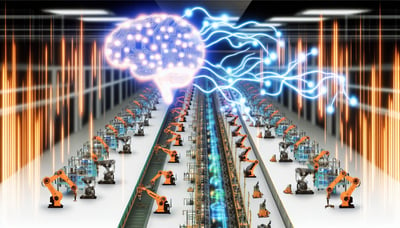Reinforcement Learning for Sequencing in Assembly Lines
As a Production Planner in a medical manufacturing facility, you're constantly seeking innovative solutions to enhance efficiency, reduce costs, and improve quality. One area that holds immense promise is the integration of reinforcement learning algorithms with assembly line sequencing.
In this blog, we look into how reinforcement learning is revolutionizing production planning, particularly in the context of medical manufacturing. We'll explore the benefits, challenges, and the integration potential with leading ERP, SCM, and MES systems like PlanetTogether and SAP, Oracle, Microsoft, Kinaxis, Aveva, among others.

Understanding Reinforcement Learning
Reinforcement learning (RL) is a machine learning paradigm inspired by behavioral psychology, where an agent learns to make decisions by interacting with an environment. Unlike traditional supervised learning, RL doesn't rely on labeled datasets but instead learns from trial and error, aiming to maximize cumulative rewards. This makes it particularly well-suited for dynamic and complex environments, such as assembly lines in medical manufacturing facilities.
The Challenges of Assembly Line Sequencing
Assembly line sequencing is a critical aspect of production planning, determining the order in which tasks are executed to optimize throughput, minimize idle time, and adhere to constraints such as production deadlines and resource availability. Traditionally, deterministic algorithms or heuristic methods have been employed for sequencing, often relying on predefined rules or expert knowledge. However, these approaches may struggle to adapt to changing conditions or handle the intricacies of real-world manufacturing environments.

Benefits of Reinforcement Learning in Sequencing
The application of reinforcement learning in assembly line sequencing offers several compelling advantages:
Adaptability: RL algorithms can adapt to dynamic and uncertain conditions, continuously learning and optimizing sequencing decisions based on real-time feedback from the environment. This adaptability is particularly valuable in medical manufacturing, where production requirements and constraints can vary unpredictably.
Optimization: RL algorithms excel at exploring and exploiting the solution space to find optimal or near-optimal sequencing strategies, balancing conflicting objectives such as throughput, resource utilization, and minimizing production bottlenecks.
Flexibility: Unlike traditional algorithms, RL is not constrained by rigid rules or assumptions. It can incorporate complex objectives, constraints, and preferences, allowing for more flexible and tailored sequencing solutions.

Integration with ERP, SCM, and MES Systems
The successful implementation of RL-based sequencing in medical manufacturing hinges on seamless integration with existing enterprise systems such as ERP, SCM, and MES. These systems, including PlanetTogether and industry leaders like SAP, Oracle, Microsoft, Kinaxis, and Aveva, serve as the backbone of production planning and control, providing crucial data and functionalities for decision-making.
Integration Points:
Data Exchange: Seamless data exchange between RL algorithms and ERP, SCM, and MES systems is essential for real-time decision-making. This includes accessing production schedules, inventory levels, resource capacities, and other relevant information.
Decision Support: RL algorithms can augment existing decision support systems by providing optimized sequencing recommendations that align with production goals and constraints. Integration with ERP systems allows for the direct implementation of these recommendations into production schedules.
Feedback Loop: Establishing a feedback loop between RL algorithms and enterprise systems enables continuous learning and improvement. Performance metrics, such as throughput, cycle time, and resource utilization, can be fed back into the RL model to refine sequencing strategies over time.
Challenges and Considerations
While the integration of reinforcement learning with ERP, SCM, and MES systems holds immense promise, several challenges and considerations must be addressed:
Data Quality and Availability: The success of RL algorithms relies on high-quality and timely data. Ensuring data accuracy, consistency, and completeness across disparate systems can be challenging and requires robust data integration mechanisms.
Computational Complexity: RL algorithms can be computationally intensive, especially when dealing with large-scale manufacturing environments or complex optimization objectives. Efficient implementation and scalable architectures are essential to handle the computational burden.
Human-AI Collaboration: Effective collaboration between human planners and AI systems is crucial for successful implementation. Planners must trust and understand the recommendations generated by RL algorithms, while also providing domain expertise and context-specific knowledge.
The integration of reinforcement learning with assembly line sequencing represents a paradigm shift for production planners in medical manufacturing facilities. By leveraging the adaptability, optimization, and flexibility of RL algorithms, planners can unlock new levels of efficiency, agility, and competitiveness. Seamless integration with ERP, SCM, and MES systems, including PlanetTogether and leading providers such as SAP, Oracle, Microsoft, Kinaxis, and Aveva, is essential for realizing the full potential of RL-based sequencing.
While challenges exist, the promise of enhanced production planning capabilities makes the journey towards RL-enabled assembly lines an exciting and rewarding endeavor for the medical manufacturing industry. Are you ready to take your manufacturing operations to the next level? Contact us today to learn more about how PlanetTogether can help you achieve your goals and drive success in your industry.


